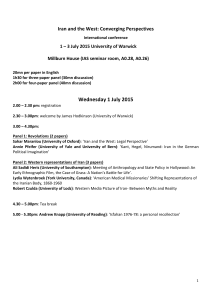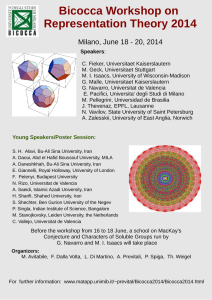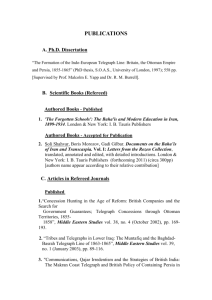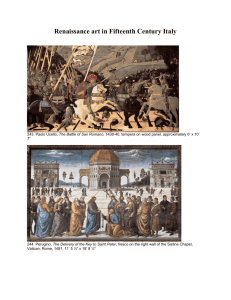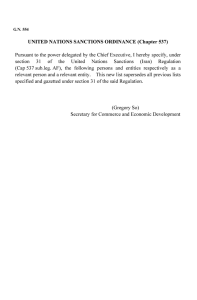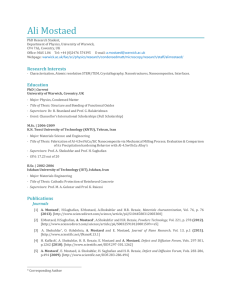Document 12820592
advertisement
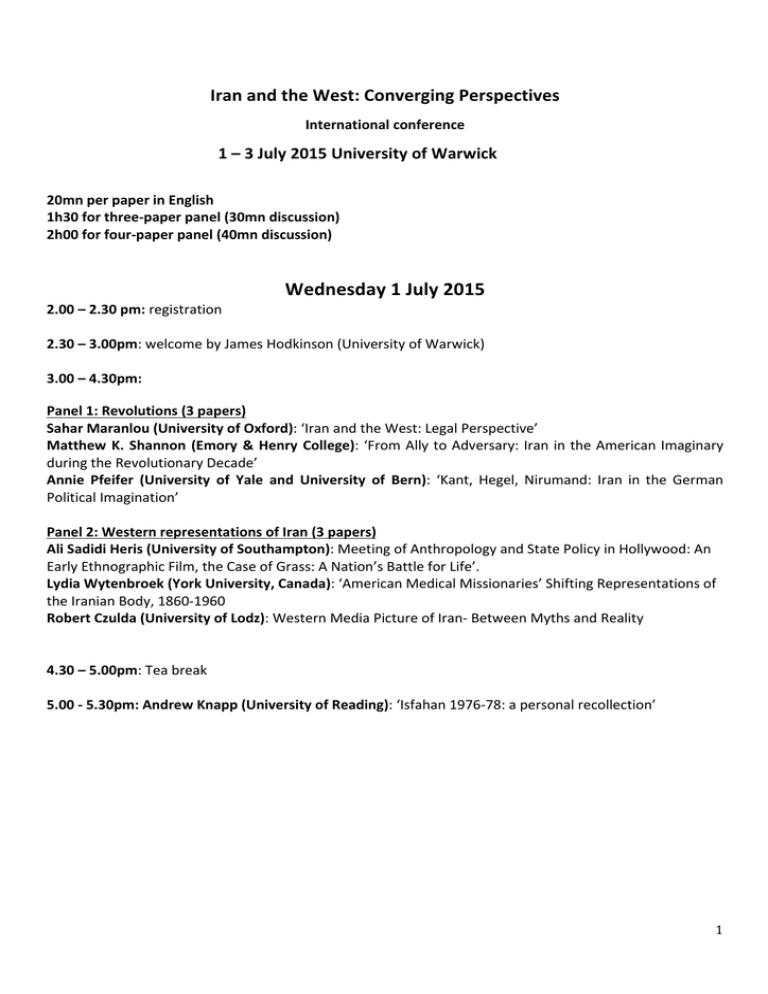
Iran and the West: Converging Perspectives International conference 1 – 3 July 2015 University of Warwick 20mn per paper in English 1h30 for three-­‐paper panel (30mn discussion) 2h00 for four-­‐paper panel (40mn discussion) Wednesday 1 July 2015 2.00 – 2.30 pm: registration 2.30 – 3.00pm: welcome by James Hodkinson (University of Warwick) 3.00 – 4.30pm: Panel 1: Revolutions (3 papers) Sahar Maranlou (University of Oxford): ‘Iran and the West: Legal Perspective’ Matthew K. Shannon (Emory & Henry College): ‘From Ally to Adversary: Iran in the American Imaginary during the Revolutionary Decade’ Annie Pfeifer (University of Yale and University of Bern): ‘Kant, Hegel, Nirumand: Iran in the German Political Imagination’ Panel 2: Western representations of Iran (3 papers) Ali Sadidi Heris (University of Southampton): Meeting of Anthropology and State Policy in Hollywood: An Early Ethnographic Film, the Case of Grass: A Nation’s Battle for Life’. Lydia Wytenbroek (York University, Canada): ‘American Medical Missionaries’ Shifting Representations of the Iranian Body, 1860-­‐1960 Robert Czulda (University of Lodz): Western Media Picture of Iran-­‐ Between Myths and Reality 4.30 – 5.00pm: Tea break 5.00 -­‐ 5.30pm: Andrew Knapp (University of Reading): ‘Isfahan 1976-­‐78: a personal recollection’ 1 Thursday 2 July 2015 9.30 – 11.00am: Panel 3: Ancient History (3 papers) Leonardo Gregoratti (University of Durham): ‘Tacitus and the Great Kings’ Bruno Genito (Università degli Studi di Napoli “L’Orientale”): The Graeco-­‐Roman World versus the Old Persian Civilisation, between Archaeology and History’ David Bagot (University of St Andrews): Roman, Iranian and Armenian perceptions in Late Antiquity 11.00 – 12.30am: Panel 4: Diplomacy (3 papers) Elham Malekzadeh (Research Centre of Humanities and Cultural Studies, Tehran): The narrative Documentary of History and Cultural Relations between Iran and Romania’ Hamed Kazemzadeh + Anahita Shahrokhi (University of Warsaw): ‘Historical and cultural relations between Poland and Persia in the 16th – 18th centuries’ Jane Grogan (University College Dublin): ‘Acts of faith? Archaeology, Diplomacy and the Arts of Government’ Panel 5: Representations of Women (4 papers) Maryam Aras (University of Cologne): ‘Huris, Amrads and the Western Gaze – Gender Images and the Notion of Beauty from Qajar to Post-­‐Revolutionary Iran’ Birgit Röder (University of Warwick): ‘”With truths of a certain kind, it is not enough to make them appear convincing: one must also make them felt” (Montesquieu, Persian Letters). The Many Faces of Soraya’ Negar Habibi (Aix-­‐Marseille University): ‘Zan-­‐i farangi, a symbol of Occident: The European women in farangi sazi paintings (1666 – 1694) Roxanne Bibizadeh (University of Warwick): ‘Casting New Shadows and Unveiling Voices: Rediscovering Iranian Women's Memoir Genre’ 12.30 – 1.30pm: lunch 1.30 – 3.00pm: Panel 6: Decline and demonization (3 papers) Meir Litvak (Tel-­‐Aviv University): The Decline of the West in Contemporary Iranian Discourse Laleh Gomari-­‐Luksch (University of St Andrews and University of Tübingen): The Great Satan and the Axis of Evil: The Politics of demonization in Iran and the United States Ali Parchami (Royal Military Academy Sandhurst): Conflicting Perceptions and Narratives: The Competition Between Iran and Its Western Antagonists Panel 7: Iran and the UK (3 papers) Nahid Ghani: ‘Demonizing Britain, Embracing Russia: Political Double Standards or Political Oblivion?’ Savka Andic (University of Oxford): ‘Britain and Revolutionary Iran, 1906-­‐1909 and 1976-­‐1979: A Comparative Study’ Nimrod Zagagi (Tel-­‐Aviv University): ‘Pride and Prejudice: Oil workers and the British in Abadan 1910-­‐ 1950’ 2 3.00 – 3.30pm: tea break 3.30 – 5.00pm: Panel 8: Cooperation (2 papers) George Sanikidze (Ilia State University, Tbilisi): ‘Tbilisi as a bridge between Iran and Europe in the 19th century’ Muhammad Athar Masood (University of the Punjab, Lahore): ‘Possibilities of a Renewed Engagement between Iran and the West’ Panel 9: Cultural influences and soft power (3 papers) Helen Giunashvili (G. Tsereteli Institute of oriental Studies, Ilia State University, Tbilisi): ‘Medieval Iran and Georgia: Historical-­‐Cultural Context and Tendencies of Georgian Renaissance’ Mahnaz Yousefzadeh (New York University): ‘The allegorical, political, rhetorical significance of the figure of Persia for the Medici’s from Republican to Granducal Tuscany’ Liya Chechik (Jewish Museum, Moscow): ‘Relations between Venice and Iran in the late XVI century through the history of a single painting: Doge Marino Grimani receiving the Persian ambassadors by Gabriele Caliari’ 5.00 – 5.30pm: tea break 5.30 – 6.30pm: Ali Ansari (University of St Andrews): ‘Iran and the West’ 3 Friday 3 July 2015 9.30 – 11.30am: Panel 10: Literary dialogues (4 papers) Nina Zandjani (University of Oslo): ‘German translations of Sa’di’s Golestân (The Rosegarden)’ Amir Ahmadi Arian (University of Queensland): ‘Persian Letters Against the Grain’ Morteza Hashemi (Coventry University): ‘On Abbas Mirza’s Dialogue with Jaubert: Iranians answer to the question of the rise of the West’ Margaux Whiskin (University of Warwick): ‘Xerxes and Leonidas: Conversations between Iran and the West in dialogues of the dead’ Panel 11: Globalisation and cultural change (4 papers) Giulia Valsecchi (University of Bergamo): ‘Homeland dramatizations and native gaze demolitions in Nahid’s Rachlin’s Foreigner and Porochista Khakpour’s Sons and other flammable objects’ Sivan Balslev (Tel-­‐Aviv University): ‘Westernisation, Masculinity and Social Distinction in Iran, circa 1900-­‐ 1920’ Samaneh Zandian (University of Warwick): ‘Miss, everyone thinks it’s very nice there, but is it really?’ – Young learners in Iran and their perceptions of transition and intercultural interaction Ali Beh-­‐Pajooh (Hamburg University): ‘The Experience of Modernity in Iranian Popular Novels of Reza Shah’s Era (1921 – 1941)’ 11.30 – 12.00am: closing remarks 12.00 – 12.30am: tea break 4
